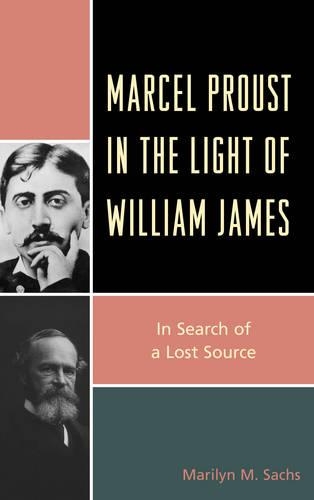
Marcel Proust in the Light of William James: In Search of a Lost Source
(Paperback)
Publishing Details
Marcel Proust in the Light of William James: In Search of a Lost Source
By (Author) Marilyn M. Sachs
Bloomsbury Publishing PLC
Lexington Books
27th March 2017
United States
Classifications
Professional and Scholarly
Non Fiction
Literary studies: c 1900 to c 2000
843.912
Physical Properties
Paperback
328
Width 150mm, Height 230mm, Spine 24mm
494g
Description
For a century now, scholars have searched for the source of Marcel Prousts startlingly innovative novel la recherche du temps perdu. Some have pointed to Henri Bergson, Sigmund Freud, or Paul Sollier. Others have referenced the novels of Henry James. But no one has focused on the more significant influence of the writings of Henrys older brother, the psychologist and Harvard professor William James. A close comparison reveals the degree to which Prousts novel stems from Jamess psychological and philosophical theories. William James was a prominent member of the scientific, medical and philosophical communities in Prousts Paris and was close friends with two men well known to Proust. His works were translated into French and reviewed in French journals and newspapers. This book discloses how Proust likely became familiar with William James and illustrates how Jamess writings were key to Prousts ability to craft the book he had been trying to write, extending even to his use of similar language and imagery and a narrative schema that arguably mimics Jamess descriptions of consciousness, perception, and memory. Prousts hero assiduously explores the vague, uncertain, relational aspects of experience, the trials and comforts of habit, the salvational potential of memory, the moral aspects of personal history teeming with impression and desirethese are the truths of human psychology and behavior theorized by William James and made fictional flesh in Prousts rendition of lived experience.
Reviews
Though whole monographs have been committed to identifying individual writers as important sources for Marcel Proustincluding Henry James and Henri Bergsonnone, Sachs argues, have done justice to the influence of William James. Her book rectifies this oversight by providing a thoroughly researched, exhaustively detailed account of the many correspondences between Jamess writings and Prousts novels. Sachs illuminates how Prousts aestheticized depictions of mental life echo Jamess scientific discoveries, leaving larger Jamesian concerns mostly in the shadows. Accordingly, the book will appeal primarily to scholars of Proust, and secondarily to scholars of James or early psychology. * William James Studies *
Marilyn M. Sachs's Marcel Proust in the Light of William James: In Search of a Lost Source is an original and important contribution to Proust studies. Well researched and written in a lucid and engaging style, her book offers the reader an excellent literary and philosophical study of these two major figures while underscoring the many parallels between James's pioneering work in psychology and Proust's innovations as a novelist. -- William C. Carter, Distinguished Professor of French, University of Alabama at Birmingham
Author Bio
Marilyn M. Sachs holds a doctorate in French literature. She is an independent scholar living in St. Louis, Missouri.
